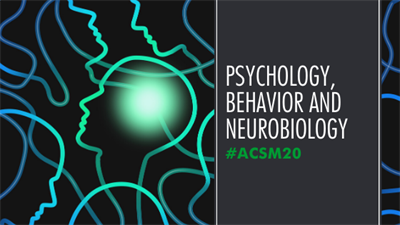Mélanie Poudevigne, Ph.D., FACSM |
Jan.
27, 2020
 In preparation for the 2020 meeting, ACSM welcomed the most submissions for an Annual Meeting in Psychology, Behavioral Sciences and Neuroscience. We want to thank you for your support of this rising area in the college as we continue to address mental health as a necessity to a person’s well-being, healthy family and interpersonal relationships, and the ability to live a full and productive life.
In preparation for the 2020 meeting, ACSM welcomed the most submissions for an Annual Meeting in Psychology, Behavioral Sciences and Neuroscience. We want to thank you for your support of this rising area in the college as we continue to address mental health as a necessity to a person’s well-being, healthy family and interpersonal relationships, and the ability to live a full and productive life.
This year, we decided to focus programming selection on the use of technology: It is not just changing the way people interact with the world, it is also changing the way we study human behavior and the brain. New technologies are allowing us to take our research out of the lab and into our communities where theories can be tested in real world settings.
Programming begins on Wednesday, May 27, with two symposiums back-to-back, starting with the highlighted symposium, “New Findings on the Science of Pacing in Physical Activity and Sport Performance,” at 1 p.m. In recent years, there has been an explosion of research on pacing, due in large part to the implementation of novel experimental paradigms such as avatars, brain mapping technologies and data science. These and other methodologies have greatly enhanced our understanding of the perceptual inputs and neurobiological pathways involved in the decision making processes that underlie pacing. The findings of pacing research will be presented with recent conceptualizations of fatigue theories, the placebo effect in sport and exercise and physical activity patterns existing in non-athletes. Session chair, Jack Raglin, Ph.D., FACSM, invited five outstanding researchers: David Williams, Ph.D., from Brown University School of Public Health, Florentina Hettinga, Ph.D., FACSM, from Northumbria University in the UK, doctoral students Stein Menting and Inge Stoter from the University Medical Center Groningen in the Netherlands and Dominic Micklewright, Ph.D., FACSM, Dean of Partnerships from University of Essex.
Right after the highlighted symposium, please join us for a two-hour sensational clinically-driven symposium, “Exercise and Addiction,” with four prominent researchers in this area. Chad Rethorst, Ph.D., Director, Clinical Research at WW (formerly Weight Watchers) will introduce the topic followed by lectures by Adam Joseph Gordon, M.D., MPH, Chief of Addiction Medicine for the Salt Lake City VA Health Care System and Professor of Internal Medicine at the University of Utah, Ana M. Abrantes, Ph.D., Professor of Psychiatry & Human Behavior at Brown University and David Pennington, Ph.D., Clinical Research Psychologist and Associate Director of the Addiction Research Program at the San Francisco Veterans Affairs Health Care System (SFVAHCS), who is poised to make new breakthroughs in the development of highly salient cognitive training paradigms to help reduce heavy drinking and problematic substance use in underserved patient populations. These four clinicians will offer their perspectives on the current states of addiction and addiction treatment with exercise and the use of technology in addiction treatment, particularly among Veterans with alcohol use disorder. The use of virtual reality and cognitive retraining in combination with exercise to improve cognitive function will be demonstrated along with the relevant assessment of cognitive impairments in addiction, as well as utilizing neuroimaging to measure change across time in clinical trials.
Another symposium you will not want to miss, “A Little Goes a Long Way: Impacts of Acute Exercise on Brain and Behavior,” happens on Saturday, May 30, starting at 9 a.m. looking at the impact of acute exercise on brain health and behavior with Margaret Tanner, Ph.D., from UC Denver, Alfonso Alfini, Ph.D., from the Department of Mental Health at Johns Hopkins University, Alexis Slutsky, Ph.D., from the Kinesiology Department at UNC Greensboro, and Matthew Herring, Ph.D., FACSM from the University of Limerick in Ireland. Regular physical activity has established, profound benefits to the brain and mental health, but achieving these benefits can be challenging due to the difficulty to adhere to long-term exercise programs. Single, acute bouts of exercise have the potential to be accessible therapeutic alternatives to chronic exercise, but the benefits of acute exercise bouts to the brain and behavior are not well known. Elucidating the effects of acute exercise may provide deeper understanding of the beneficial adaptations realized with long-term participation. Speakers in this session will address the impact of acute exercise bouts on anxiety, mood, cognition, neural circuit functional connectivity and the neuro-molecular basis for these effects. The integrative approaches presented will provide broad support for the idea that when it comes to nervous system function and mental health, a little exercise can go a long way.
The American Psychological Association Exchange Lecture, “The A.I.R. We Breathe: Advocacy, Inclusion, Representation and the Importance of Attending to Cultural Diversity in the World of Sport,” on Friday, May 29 at 9:30 a.m. features The Association for Applied Sport Psychology (AASP) President-elect Kensa Gunter, PsyD, CMPC. AASP is currently the leading organization for sport psychology consultants and professionals in North America. Dr. Gunter will focus on advocacy, inclusion, representation and the importance of attending to cultural diversity in sport. If you would like to learn more about cultural competence and developing humility in sport while paying attention to creating culturally inclusive spaces, this session is for you.
Learn more about the featured slide sessions on mental health and neuroscience and the many other posters and tutorials such as the one led by Associate Dean Erica Taylor, Ph.D., FACSM, on strategies to encourage our community to sit less and move more using technology in which I will also participate. Please also consider joining our special interest group, Psychobiology and Behavior*, to become a part of our growing network of behavioral scientists.
Register for the 2020 ACSM Annual Meeting in San Francisco here.
*Special Interest Groups meet either Wednesday at 5:45 p.m. or Thursday at 6:15 p.m., and meeting rooms will be assigned closer to the event date. For meeting night and room location, attendees can look in the on-site Conference and Exhibit Guide or use the ACSM mobile app.
 Mélanie Poudevigne, Ph.D., FACSM, ACSM-EP, started her career in Europe with the Paris V Lacretelle STAPS and graduated with her doctorate as a Graduate Research Assistant in Exercise Science at the University of Georgia where she worked with special populations in mental health and cardiac rehabilitation with young gymnasts, pregnant women and elderly dawgs fans. She also holds a Masters in Sport Management from Georgia Southern. Her scientific work focuses on exercise/mental performance for the general public and elite athletes worldwide. When she is not busy teaching, she creates service learning opportunities pairing academic educational experiences and the ACSM certifications to promote training, civic engagement, and meaningful public health research and service to underserved students at Clayton State U., in the Southern crescent of Atlanta. She contributed over 100 peer-reviewed scientific articles, book chapters on emotions, international presentations, and commercial products in health. She is a proud ACSM Fellow and certified member in exercise physiology, and she would like to encourage accomplished scientists to join her in becoming an international fellow with ACSM.
Mélanie Poudevigne, Ph.D., FACSM, ACSM-EP, started her career in Europe with the Paris V Lacretelle STAPS and graduated with her doctorate as a Graduate Research Assistant in Exercise Science at the University of Georgia where she worked with special populations in mental health and cardiac rehabilitation with young gymnasts, pregnant women and elderly dawgs fans. She also holds a Masters in Sport Management from Georgia Southern. Her scientific work focuses on exercise/mental performance for the general public and elite athletes worldwide. When she is not busy teaching, she creates service learning opportunities pairing academic educational experiences and the ACSM certifications to promote training, civic engagement, and meaningful public health research and service to underserved students at Clayton State U., in the Southern crescent of Atlanta. She contributed over 100 peer-reviewed scientific articles, book chapters on emotions, international presentations, and commercial products in health. She is a proud ACSM Fellow and certified member in exercise physiology, and she would like to encourage accomplished scientists to join her in becoming an international fellow with ACSM.